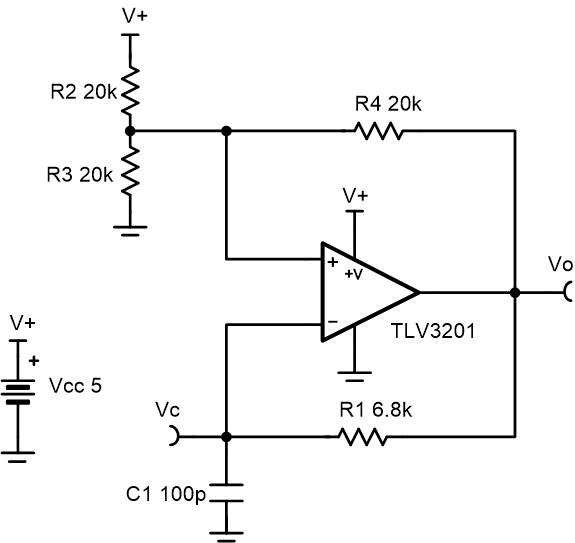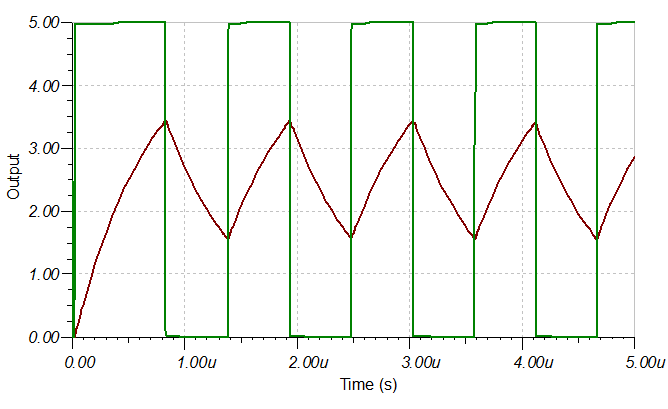SNOA998A June 2018 – October 2024 TLV3201 , TLV7011
Design Goals
| Supply | Oscillator Frequency | |
|---|---|---|
| Vcc | Vee | f |
| 5V | 0V | 1MHz |
Design Description
The oscillator circuit generates a square wave at a selected frequency. This is done by charging and discharging the capacitor, C1 through the resistor, R1. The oscillation frequency is determined by the RC time constant of R1 and C1, and the threshold levels set by the resistor network of R2, R3, and R4. The maximum frequency of the oscillator is limited by the toggle rate of the comparator and the capacitance load at the output. This oscillator circuit is commonly used as a time reference or a supervisor clock source.

Design Notes
- Comparator toggle rate and output capacitance are critical considerations when designing a high-speed oscillator.
- Select C1 to be large enough to minimize the errors caused by stray capacitance.
- If using a ceramic capacitor, select a COG or NPO type for best stability over temperature.
- Select lower value resistors for the R2, R3, R4 resistor network to minimize the effects of stray capacitance.
- Adjust R2, R3, and R4 to create a duty cycle other than 50%.
Design Steps
- When R2 = R3 = R4, the resistor network sets the oscillator trip points of the non-inverting input at one-third and two-thirds of the supply.
- When the
output is high, the upper trip point is set at two-thirds of the supply to bring
the output back low.
- When the output is low, the lower trip point is set at one-third
of the supply to bring the output back high.
- The timing of the oscillation is controlled by the charging and
discharging rate of the capacitor C1 through the resistor
R1. This capacitor sets the voltage of the inverting input of the
comparator. Calculate the time to discharge the capacitor.
- Calculate the time to charge the
capacitor.
- The time for the capacitor to
charge or discharge is given by 0.69R1C1. With a target
oscillator frequency of 1 MHz, the time to charge or discharge should be 500ns.
- Select C1 as 100pF and R1 as 6.8kΩ (the closest real world value).
Design Simulations
Transient Simulation Results

Design References
See circuit spice simulation file, SBOMAO3.
Design Featured Comparator
| TLV3201 | |
|---|---|
| Vss | 2.7V to 5.5V |
| VinCM | Rail-to-rail |
| tpd | 40ns |
| Vos | 1mV |
| VHYS | 1.2mV |
| Iq | 40µA |
| Output Type | Push-Pull |
| #Channels | 1 |
| TLV3201 | |
Design Alternate Comparator
| TLV7011 | |
|---|---|
| Vss | 1.6V to 5.5V |
| VinCM | Rail-to-rail |
| tpd | 260ns |
| Vos | 0.5V |
| VHYS | 4mV |
| Iq | 5µA |
| Output Type | Push-Pull |
| #Channels | 1 |
| TLV7011 | |